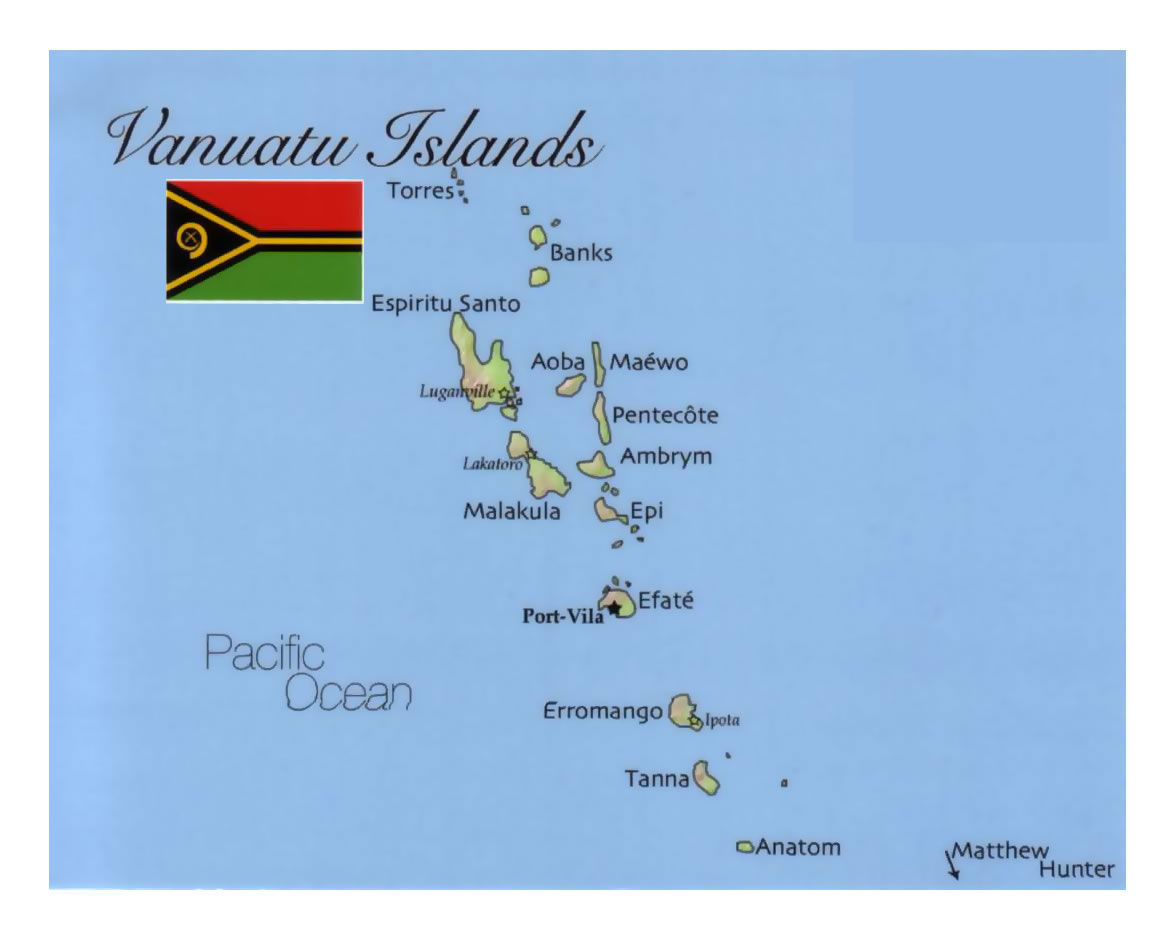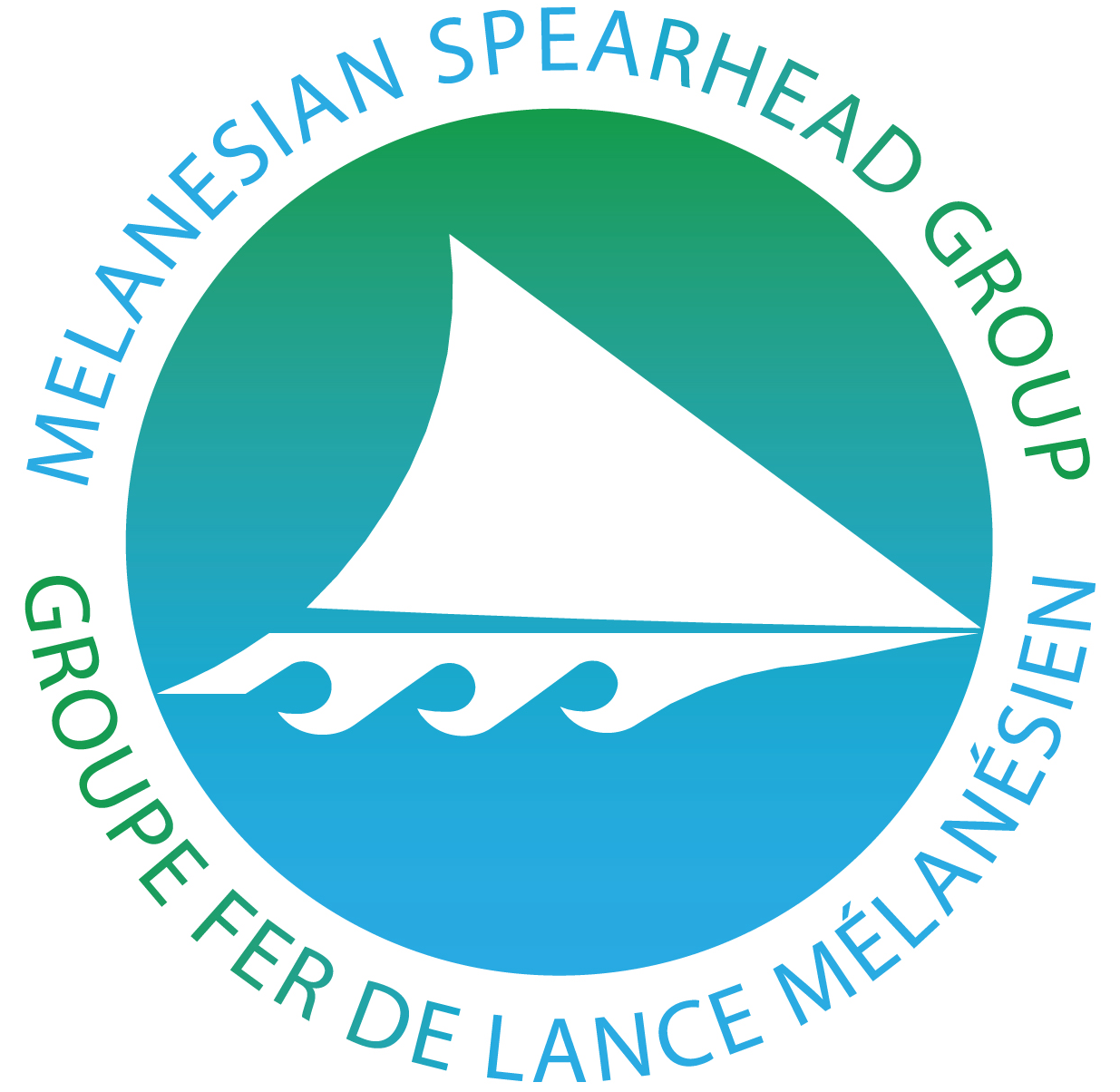REPUBLIC OF VANUATU
Background
Vanuatu is a group of islands comprising a double chain of about 40 islands and 40 islets and rocks of volcanic and coral origin. About 65 of these are inhabited, some of which have active volcanoes and many being steeply mountainous, rising on Espíritu Santo to over 1,800 metres. Fresh water is plentiful and the country has more than 2,500 km of coastline.
Ni-Vanuatu enjoy life expectancy of some 71 years.
Key facts
Joined Commonwealth: 1980
Population: 253,000 (2013)
GDP: 0.6% p.a. 1990–2013
UN HDI: World ranking 131
Official language: Bislama, English, French
Timezone: GMT plus 11hr
Currency: vatu (VT)
Geography
Area: 12,190 sq km
Coastline: 2,530km
Capital city: Port Vila
Population density (per sq. km): 21
The Republic of Vanuatu’s land area comprises a group of islands in the south-west Pacific, lying south of Solomon Islands and east of the state of Queensland in Australia. There are six provinces namely Malampa, Penama, Sanma, Shefa, Tafea and Torba.
Main towns
Port Vila (capital, pop. 47,500 in 2010) and Mele (2,500) on Efaté;
Luganville (13,800) and Port Olry (2,900) on Espíritu Santo;
Norsup (2,400) on Malakula; and
Isangel (1,700) on Tanna.
Transportation
There are 1,070 km of roads, 24 per cent paved, most of which are on Efaté.
Ferries link the islands of Vanuatu and shipping services, run by a number of operators, to Australia, New Zealand and New Caledonia. The main ports are Port Vila and Luganville.
The chief airports are at Bauerfield, near Port Vila, and Pekoa on Espíritu Santo Island; there are some 30 smaller airfields.
Airports
Vanuatu’s capital of Port Vila houses the main Bauerfield International Airport, which is the hub of Vanuatu’s flag carrier online. Originally named Efate Field and although small, the airport’s runway has the capability and length to accept jets up to the Airbus A300. The other smaller airports are located in the provinces of Malampa and Sanma, among others.
International relations:
Vanuatu is a member of the African, Caribbean and Pacific (ACP) Group of States, Non-Aligned Movement, Organisation internationale de la Francophonie, Pacific Community, Pacific Islands Forum, United Nations and World Trade Organisation.
The World Trade Organization approved Vanuatu’s accession in October 2011; the Vanuatu Parliament passed enabling legislation in December 2011; and the country became a full member of the organisation on 24 August 2012.
Topography:
Vanuatu is a 900 km-long Y-shaped archipelago which forms a double chain of about 40 mountainous islands and 40 islets and rocks of volcanic and coral origin; about 65 of these are inhabited. Islands like Tanna, Lopévi and Ambrym have active volcanoes. Many of the rocky islands are steeply mountainous, the highest peaks (on Espíritu Santo) rising to over 1,800 metres.
Climate:
Vanuatu has an oceanic tropical climate, with south-east trade winds from May to October while the period from November to April is humid, with moderate rainfall. Cyclones normally occur between November and April.
Environment:
A majority of the population does not have access to a safe and reliable supply of water (although it is improving) and deforestation are the most significant environmental issues in Vanuatu.
Vegetation:
The rocky islands are covered with thick forest and narrow coastal plains where cultivation is possible. Thirty six per cent (36%) of land area is covered by forests and there was no significant loss of forest cover during 1990–2012.
Wildlife:
Eleven species of bat exist in Vanuatu including the white flying-fox. It is also the easternmost habitation of dugongs, also known as sea-cows. Espíritu Santo has the richest bird population, with 55 species including incubator birds which leave their eggs to incubate in hot volcanic sand from which the young birds emerge fully fledged. Seven mammal species and nine bird species are thought to be endangered (2014).
Economy:
GNI: US$794m
GNI PC: US$3,130
GDP Growth: 2.0% p.a. 2009–13
Inflation: 2.1% p.a. 2009–13
Vanuatu’s economy is based on agriculture, fishing, tourism and offshore financial services but much of the agriculture is subsistence farming. As most exports are agricultural like copra, coconut oil, kava, beef, timber, cocoa and coffee, Vanuatu is vulnerable to fluctuations in world commodity prices. The country has inherent economic difficulties (it is remote and isolated, so faces heavy transport costs, and it is prone to cyclone damage) and is therefore dependent on aid for development projects.
COVID-19
On 26 March 2020 the President of Vanuatu signed a declaration for a State of Emergency (SOE) over the whole of Vanuatu for a two-week period, for the purpose of strengthening prevention and containment measures in response to the COVID-19 global pandemic. On 11 April 2020 the SOE was extended for a 30-day period, for the dual purposes of continuing COVID-19 prevention and containment measures as well as responding to Tropical Cyclone Harold which impacted Vanuatu on 6 – 7 April 2020. On Thursday 11th of June the SOE regarding COVID-19 and Tropical Cyclone Harold was extended for an additional 30-day period. These SOE Declarations allow special powers as set out in the Disaster Risk Management Act No. 23 of 2019.
Non-health information related to the SOE is available on the website of the National Disaster Management Office.
As of 1 July 2020, there have been no confirmed cases of COVID-19 reported in Vanuatu. The situation can change rapidly.
This Ministry of Health website includes the latest health information and updates related to COVID-19.
Constitution:
Status: Republic
Legislature: Parliament of Vanuatu
Independence: 30 July 1980
Vanuatu is a republic with a non-executive presidency. The President is elected by Parliament together with the Presidents of the regional councils and serves a five-year term. The single-chamber Parliament has 52 members, directly elected every four years by universal adult suffrage with an element of proportional representation. Parliament appoints the Prime Minister from among its members, and the Prime Minister appoints a council of ministers from among the MPs. The constitution provides for a certain amount of decentralisation, intended to promote regional autonomy and local participation.
https://thecommonwealth.org/our-member-countries/vanuatu
E Stret Nomo
Long God
Yumi Stanap

